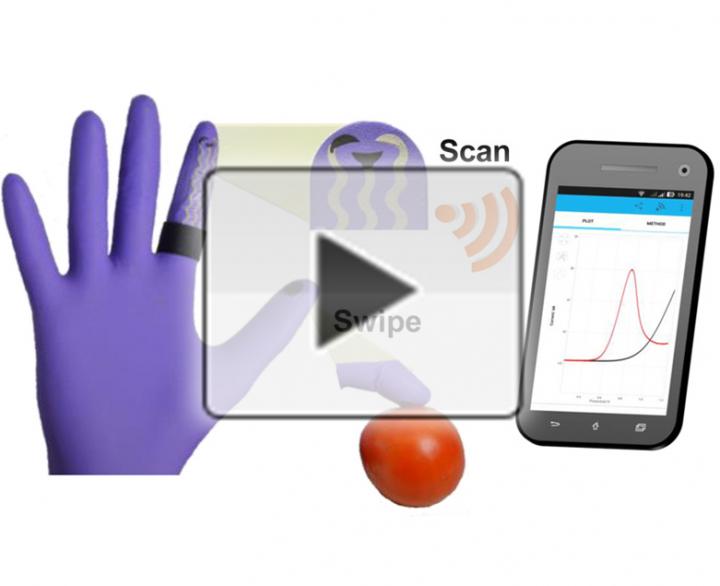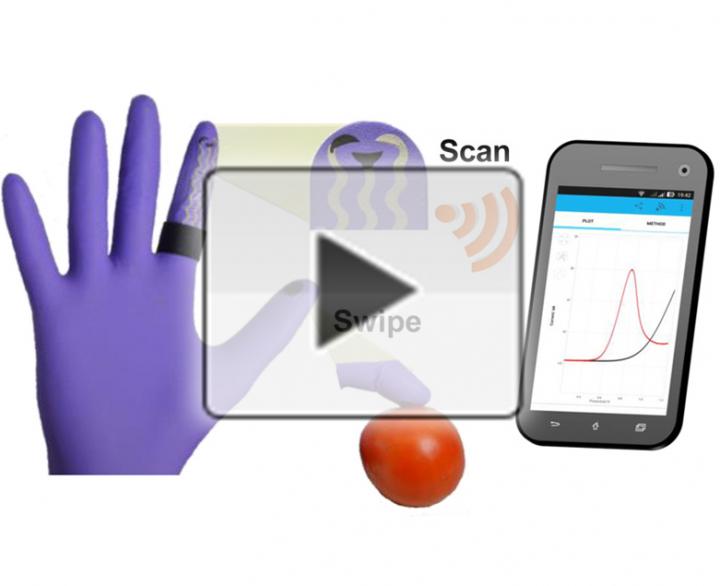
Credit: Credit: American Chemical Society
There's a reason why farmers wear protective gear when applying organophosphate pesticides. The substances are very effective at getting rid of unwanted bugs, but they can also make people sick. Related compounds — organophosphate nerve agents — can be used as deadly weapons. Now researchers have developed a fast way to detect the presence of such compounds in the field using a disposable "lab-on-a-glove." The report on the glove appears in the journal ACS Sensors.
Organophosphate nerve agents, including sarin and VX, are highly toxic and can prevent the nervous system from working properly. Organophosphate pesticides are far less potent but work in a similar way and can cause illness in people who are exposed to them, according to the U.S. Centers for Disease Control and Prevention. Detecting either type of these sets of compounds accurately and quickly could help improve both defense and food security measures. So, Joseph Wang and colleagues set out to develop a wearable sensor that could meet the requirements of field detection.
The new wearable, flexible glove biosensor carries out the sampling and electrochemical biosensing steps on different fingers, with the thumb finger used for collecting the nerve-agent residues and an enzyme immobilized on the index finger. The researchers created stretchable inks to print the collection and sensing elements on these fingers. Detection of the collected residues is performed when the thumb touches the printed enzyme-based organophosphate biosensor on the glove index finger. So, a user would swipe the thumb of the glove on a surface for testing, then touch the thumb and index fingers together for the electrochemical analysis. For real-time results, the voltammetric data are sent via a reusable Bluetooth device on the back of the glove to a user's mobile device. Testing showed that the glove could detect organophosphate pesticides methyl parathion and methyl paraoxon on various surfaces — including glass, wood and plastic — and on produce. The researchers say the sensor could be used in both security and food safety settings.
###
The authors acknowledge funding from the Defense Threat Reduction Agency Joint Science and Technology Office for Chemical and Biological Defense.
Watch the Headline Science video to learn more.
The study is freely available as an Editors' Choice article here.
The American Chemical Society is a nonprofit organization chartered by the U.S. Congress. With nearly 157,000 members, ACS is the world's largest scientific society and a global leader in providing access to chemistry-related research through its multiple databases, peer-reviewed journals and scientific conferences. ACS does not conduct research, but publishes and publicizes peer-reviewed scientific studies. Its main offices are in Washington, D.C., and Columbus, Ohio.
To automatically receive news releases from the American Chemical Society, contact [email protected].
Follow us on Twitter | Facebook
Media Contact
Katie Cottingham
[email protected]
301-775-8455
@ACSpressroom
http://www.acs.org
############
Story Source: Materials provided by Scienmag





